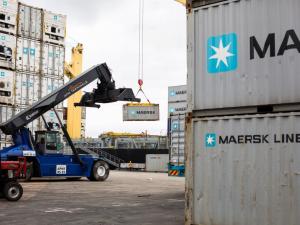AP MOELLER-MAERSK, the owner of the largest shipping container line, is seeking to win contracts to build and upgrade ports in Nigeria and Kenya as the Danish company expands its African operations.
Maersk is awaiting a final sign-off on a contract to help build a new port in Badagry in Nigeria’s southern Lagos state, according to Lars Reno Jakobsen, the company’s senior vice-president for Africa.
“That project, once it has been finalised could be more than $2 billion (R25bn) in terms of investment,” he said in an interview at the World Economic Forum in Cape Town on Friday. “Hopefully we can start some time this year. It will provide capacity, not only for containers, but also for oil, break-bulk and offshore.”
Maersk employs almost 10 000 people in more than 40 African nations and generates about 10 percent of its sales in and around the continent. Besides its shipping business, the Copenhagen-based company supplies oil- and gas-related services.
The company’s APM Terminals unit operates 10 west African ports.
“We are actively looking in east Africa for opportunities,” Jakobsen said. “There is an ongoing tender process for the port of Mombasa, where APM Terminals has shown interest” in building two new berths in the Kenyan city.
Maersk is also working on a $1bn expansion to Ghana’s Tema port in collaboration with the west African nation’s ports authority. The project includes the construction of four new berths and will more than quadruple the port’s capacity.
In 2013, Maersk partnered with Bollore and Bouygues to win a e450 million (R6.29bn) contract to build a second container terminal in Abidjan, Ivory Coast’s commercial capital. The terminal should start operating next year as planned, Jakobsen said.
Maersk sales from Africa have been growing 5 percent to 6 percent a year, tracking the continent’s economic growth, and Jakobsen expects the trend to continue.
Shipments of agricultural products, textiles and clothing were rising as the continent diversified trade away from raw materials, while more electronic and consumer goods were being imported, he said.
“Africa is moving up in the value chain,” he said. “People can now probably afford things they couldn’t earlier on. Underlying sentiment is positive.”
FRENCH VERSION
Maersk est en attente d’une approbation définitive sur un contratpour aider à construire un nouveau port à Badagry dans l’état deLagos du sud du Nigeria, selon Lars Reno Jakobsen, premier vice-président de la société pour l’Afrique.
“Ce projet, une fois qu’il aura été finalisée pourrait être plus de $2 milliards (R25bn) en termes d’investissement,” dit-il dans uneinterview lors du Forum économique mondial au Cap vendredi.“J’espère que nous pouvons commencer quelque temps cetteannée. Il permettra, non seulement pour les conteneurs, maisaussi pour l’huile, marchandises diverses et au large. »
Maersk emploie près de 10 000 personnes dans plus de 40 paysafricains et génère environ 10 % de ses ventes dans et autour ducontinent. Outre ses activités de transport maritime, l’entreprisebasée à Copenhague fournit des services liés à l’huile et gaz.
La société APM Terminals fonctionne de 10 ports d’Afrique del’Ouest.
« Nous recherchons activement des in east Africa possibilités, »dit Jenny. « Il est un processus d’appel d’offres pour le port deMombasa, où APM Terminals a montré un intérêt » dans laconstruction de deux nouveaux postes d’amarrage dans la villekenyane.
Maersk travaille également sur une expansion de 1 milliard $ auport de Tema du Ghana en collaboration avec l’autorité portuairede la nation ouest–africaine. Le projet comprend la constructionde quatre nouveaux postes à quai et sera plus que quadrupler lacapacité du port.
En 2013, Maersk en partenariat avec Bolloré et Bouygues pourgagner un e450 millions (R6.29bn) contrat pour construire unsecond récipient terminal dans la capitale commerciale Abidjan,Côte d’Ivoire. Le terminal devrait commencer d’exploitationl’année prochaine, comme prévu, a déclaré Jenny.
Maersk ventes d’Afrique ont progressé de 5 % à 6 % par an, suivide la croissance économique du continent, et Jenny attend latendance se maintiendra.
Livraisons de produits agricoles, textiles et vêtementsaugmentaient aussi le continent divers échanges de matièrespremières, tandis que plus électronique et des biens deconsommation étaient importées, dit-il.
« L’Afrique se déplace vers le haut dans la chaîne de valeur, » dit-il. “Les gens peuvent maintenant probablement se permettre leschoses qu’ils ne pouvaient pas tout à l’heure. Qui sous-tendent lesentiment est positif. »


